Seven Brides for Seven Brothers (1954)
“You’re beating your head against a stone wall, Milly: You’ll never make jack-a-dandies out of them!”
|
Synopsis: |
|
Genres, Themes, Actors, and Directors:
Response to Peary’s Review: Rewatching the film recently, I was gratified to find that the seemingly distasteful storyline — “based on Stephen Vincent Benet’s ‘The Sobbin’ Women'”, which in turn “was inspired by Plutarch’s ‘The Rape of the Sabine Women'” — actually possesses a relatively strong feminist strain. Spunky Powell’s foolhardy willingness to marry Keel the day she meets him (and to wax rhapsodic in song about her desire to cook and clean for him) is tempered by her savvy calculation that this is likely her best possible option in life; it’s certainly better than the thankless work as a servant-for-hire she’s been doing until then. Of course, she didn’t bargain on Keel having six lunk-headed brothers who she’d also be expected to cook and clean for — but she quickly asserts her dominance in their household, “playing Snow White” as she attempts “to turn the ruffians into gentlemen”. And, once the film’s infamous kidnapping occurs, she retains her authority, dictating at every moment exactly what will happen next. She’s a refreshingly strong “Western” woman, and this remains one of Powell’s best roles. Interestingly, Jonathan Rosenbaum — in his review of the film for 1,001 Movies You Must See (2003) — refers to it as “a profoundly sexist” (albeit “eminently hummable”) movie, one which provides a “fascinating glimpse at the kind of patriarchal rape fantasies that were considered good-natured and even ‘cute’ at the time”, with a bevy of tunes that “accurately pinpoint the movie’s sexual politics” (such as “Bless Your Beautiful Hide” and “I’m a Lonesome Polecat”). His take is exactly how I felt as a much younger film fanatic; but at this point, I’m willing to simply place the film within its historical context, and recognize that for women at that time and in that geographical situation, finding a suitable husband really was likely the cleanest path to security and happiness. Regardless, I’m now able to appreciate Seven Brides… for its merits — vibrant widescreen Technicolor cinematography, “hummable” tunes, and truly fantastic dancing — rather than its questionable premise. Redeeming Qualities and Moments: Must See? Categories
(Listed in 1001 Movies You Must See Before You Die) Links: |
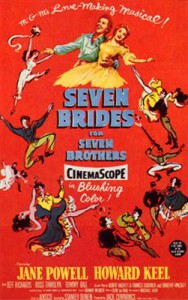
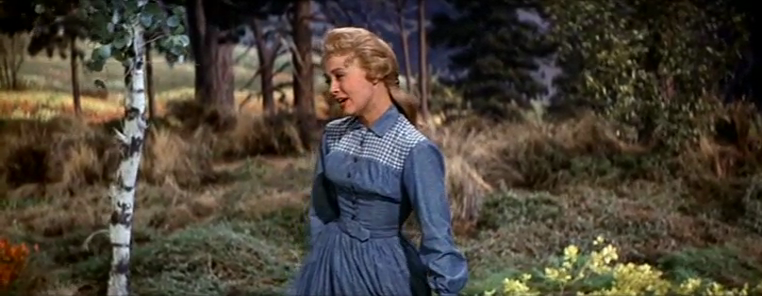
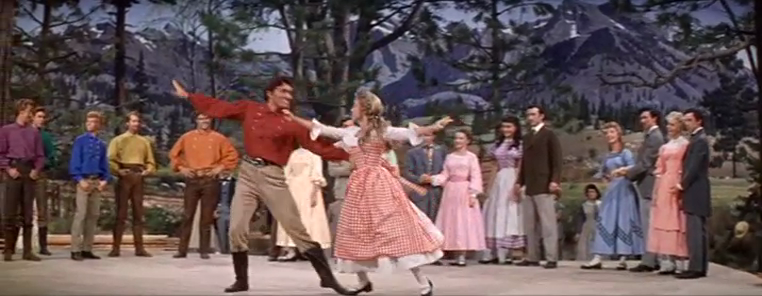
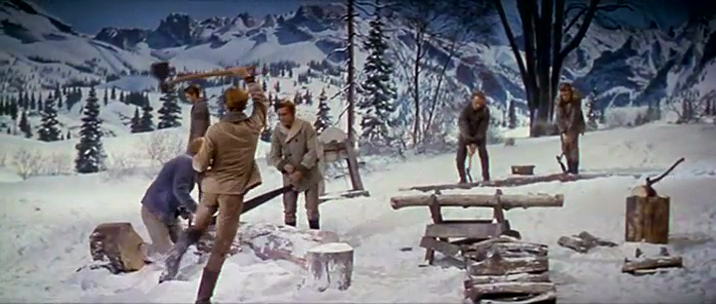
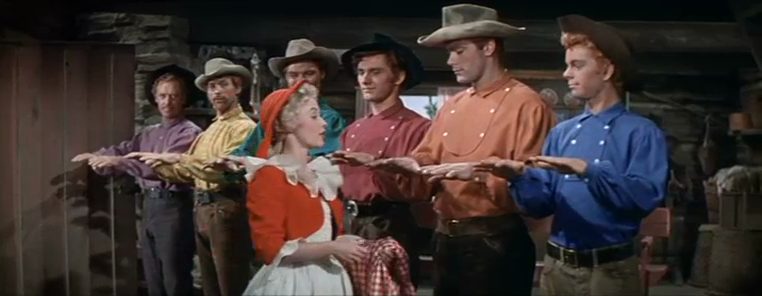
One thought on “Seven Brides for Seven Brothers (1954)”
A must – mainly for its place in cinema history, Kidd’s top-notch, ground-breaking choreography (just amazing work!) & its sheer entertainment value.
I hadn’t seen this before. I thought I had but, watching it, I realized that until now I’d only seen bits and pieces of it. I’ll say right off that, overall, it doesn’t overwhelmingly appeal to me personally – but I’ll admit that it’s a well-crafted piece of entertainment on various levels. That alone makes it worth a view.
It’s interesting to learn that, during production, MGM began taking money away from this film’s budget in order to pour more into what turned out to be the lesser project: ‘Brigadoon’ (a very somber and almost dull musical). Though, in some sense, ‘Brigadoon’ may have the better musical score, ‘Seven Brides…’ has stood the test of time and is the better film. (It doesn’t have a bad score; I’m just not partial to some of the sappier aspects of it. That said, I recognize that the score in part represents emotional attitudes of the late 1800s.)
Though presented in a totally realistic manner, the story is pure romantic fantasy. I don’t really see the family of brothers as all that backwards. Actually, though they are superficially presented as straightforward, somewhat brutish types (that is, they’ll resort to violence if they feel misunderstood or threatened), deep down all they collectively want to do is get rid of their lonesomeness, find a mate, settle down and raise a family.
Powell handily comes along to guide them assuredly in ways they were already headed towards. So, aside from teaching table manners and giving a few tips on how to treat women like women rather than men, Powell doesn’t really have all that hard a job. These are basically nice (and, therefore, rather attractive) guys.
‘Seven Brides…’ is, to some degree, a celebration of the idea of love at first sight. Interestingly, none of the relationships (other than that of the leads, a bit) is given any real screen time to develop; the six brothers find the ‘perfect’ six brides to complement them – almost in no time flat. When the brothers go to the barn-raising event, their ‘brides’ pretty much take to them almost immediately (each couple pairs up in that much time), leaving their apparently-less-desirable beaus behind. These women *want* these brothers – pronto. They just feel it – and it’s reciprocated.
Which is what makes Powell seem a little foolish when she suddenly becomes the spokesperson for what is ‘right and proper’. (I don’t really interpret Powell as being Snow White as much as Lillian Gish’s character in ‘Night of the Hunter’: like Gish, Powell is practical, with a no-nonsense attitude – mostly.) Undoubtedly, Powell feels somewhat ‘guilty’ for having given in to Keel so quickly, before realizing, or so she thinks, that there’s no such thing as love at first sight. However, she also contradicts herself, having admitted earlier that she felt something about Keel that she never felt coming from any other man. (As I said, the film seems to be making a strong argument in favor of Cupid.)
One could easily look at the film through a modern lens and find it wanting in terms of what it has to say about men and women – in other words, how things have now changed for the better. But I think, overall, the film is also a representation of what has become something of a quaint idea: that, yes, there may be some initial ‘spark’ of some kind when two people meet, but that love is something that is learned and can grow as it goes.
The screenplay by (good old dependable) Albert Hackett and Frances Goodrich – along with Dorothy Kingsley – is quite sharp. Powell and Keel are an appealing couple and seem to be enjoying themselves. The decision to cast mostly dancers in the major roles was decidedly wise. Stanley Donen’s direction is crisp and efficient.
~and the ending is wonderfully clever!
Fave song: (the phenomenal barn-raising dance aside – since it’s a dance, but what a dance!) ‘Sobbin’ Women’.